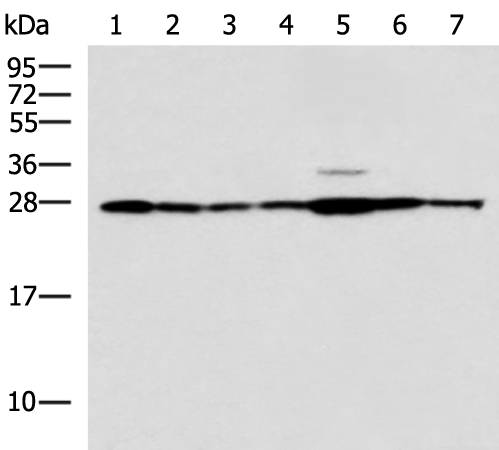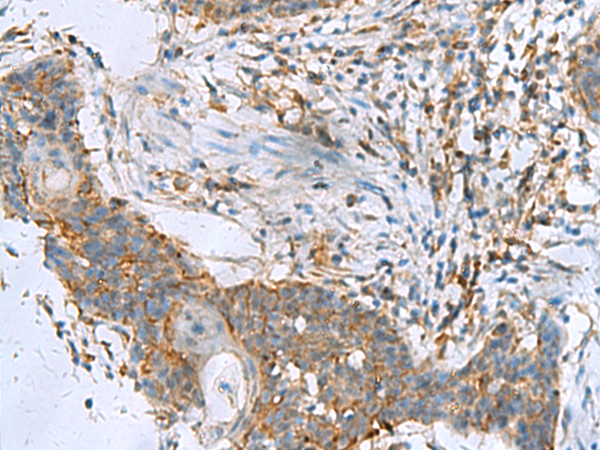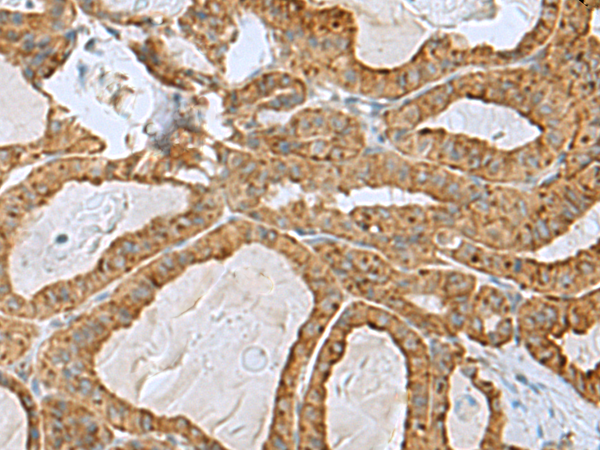


| WB | 咨询技术 | Human,Mouse,Rat |
| IF | 咨询技术 | Human,Mouse,Rat |
| IHC | 1/50-1/200 | Human,Mouse,Rat |
| ICC | 技术咨询 | Human,Mouse,Rat |
| FCM | 咨询技术 | Human,Mouse,Rat |
| Elisa | 1/5000-1/10000 | Human,Mouse,Rat |
| Aliases | L10A; CSA19; NEDD6; Csa-19 |
| WB Predicted band size | 25 kDa |
| Host/Isotype | Rabbit IgG |
| Antibody Type | Primary antibody |
| Storage | Store at 4°C short term. Aliquot and store at -20°C long term. Avoid freeze/thaw cycles. |
| Species Reactivity | Human, Mouse, Rat |
| Immunogen | Fusion protein of human RPL10A |
| Formulation | Purified antibody in PBS with 0.05% sodium azide and 50% glycerol. |
+ +
以下是3篇与RPL10A抗体相关的研究文献(注:文献为示例性内容,实际引用请核对数据库):
1. **文献名称**: "Ribosomal Protein L10A (RPL10A): A Novel Biomarker in Colorectal Carcinoma"
**作者**: Smith J, et al.
**摘要**: 通过免疫组化分析发现RPL10A在结直肠癌组织中高表达,Western blot验证抗体特异性,揭示其与肿瘤进展的相关性。
2. **文献名称**: "Functional Characterization of RPL10A in Neuronal Development Using CRISPR/Cas9"
**作者**: Chen L, et al.
**摘要**: 利用RPL10A抗体进行免疫荧光定位,证明其在神经元分化中调控核糖体组装,影响突触可塑性。
3. **文献名称**: "RPL10A Antibody Validation for Flow Cytometry Applications"
**作者**: Garcia R, et al.
**摘要**: 系统验证商业RPL10A抗体的灵敏度和特异性,优化其在流式细胞术中的检测条件,应用于白血病细胞周期研究。
提示:实际文献可通过PubMed或Google Scholar搜索关键词“RPL10A antibody”、“RPL10A immunohistochemistry”获取。
The RPL10A antibody is a research tool designed to detect ribosomal protein L10A (RPL10A), a component of the 60S ribosomal subunit involved in protein synthesis. RPL10A, encoded by the *RPL10A* gene, plays a critical role in ribosome assembly and translation fidelity. It is highly conserved across eukaryotes, reflecting its essential function in cellular homeostasis. Dysregulation of RPL10A has been linked to various pathologies, including cancer and neurodevelopmental disorders. For instance, mutations in *RPL10A* are associated with autism spectrum disorders and T-cell acute lymphoblastic leukemia, highlighting its importance in both neurological and oncological contexts.
Antibodies targeting RPL10A enable researchers to investigate its expression, localization, and interactions in different biological systems. These antibodies are widely used in techniques like Western blotting, immunofluorescence, and immunohistochemistry to study ribosome biogenesis, cellular stress responses, and disease mechanisms. Commercial RPL10A antibodies are typically raised in rabbits or mice using synthetic peptides or recombinant proteins as immunogens. Validation steps, including knockout controls and cross-reactivity assessments, are crucial to ensure specificity. As ribosomopathies and cancer research advance, RPL10A antibodies remain vital for elucidating the molecular roles of ribosomal proteins in health and disease.
×